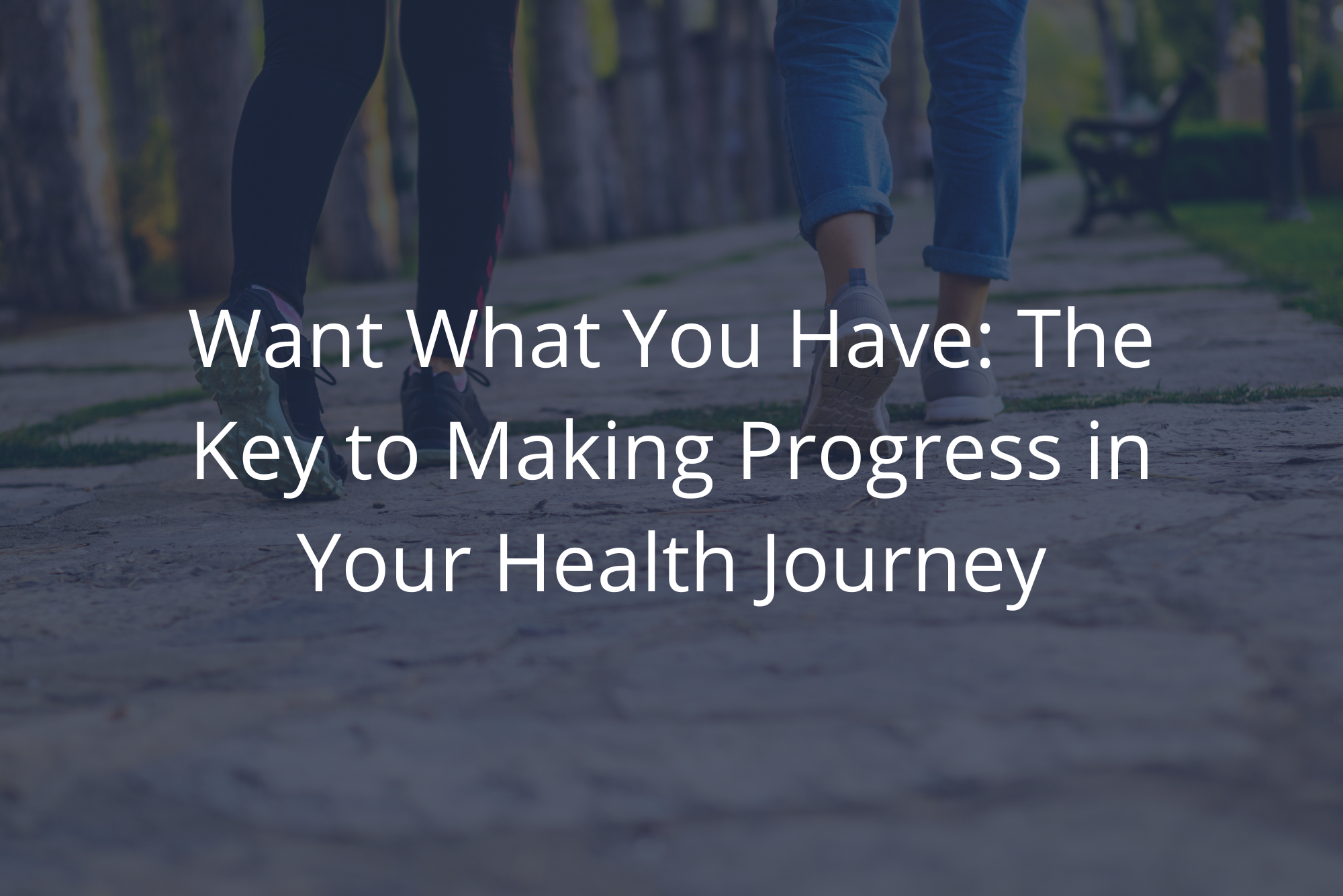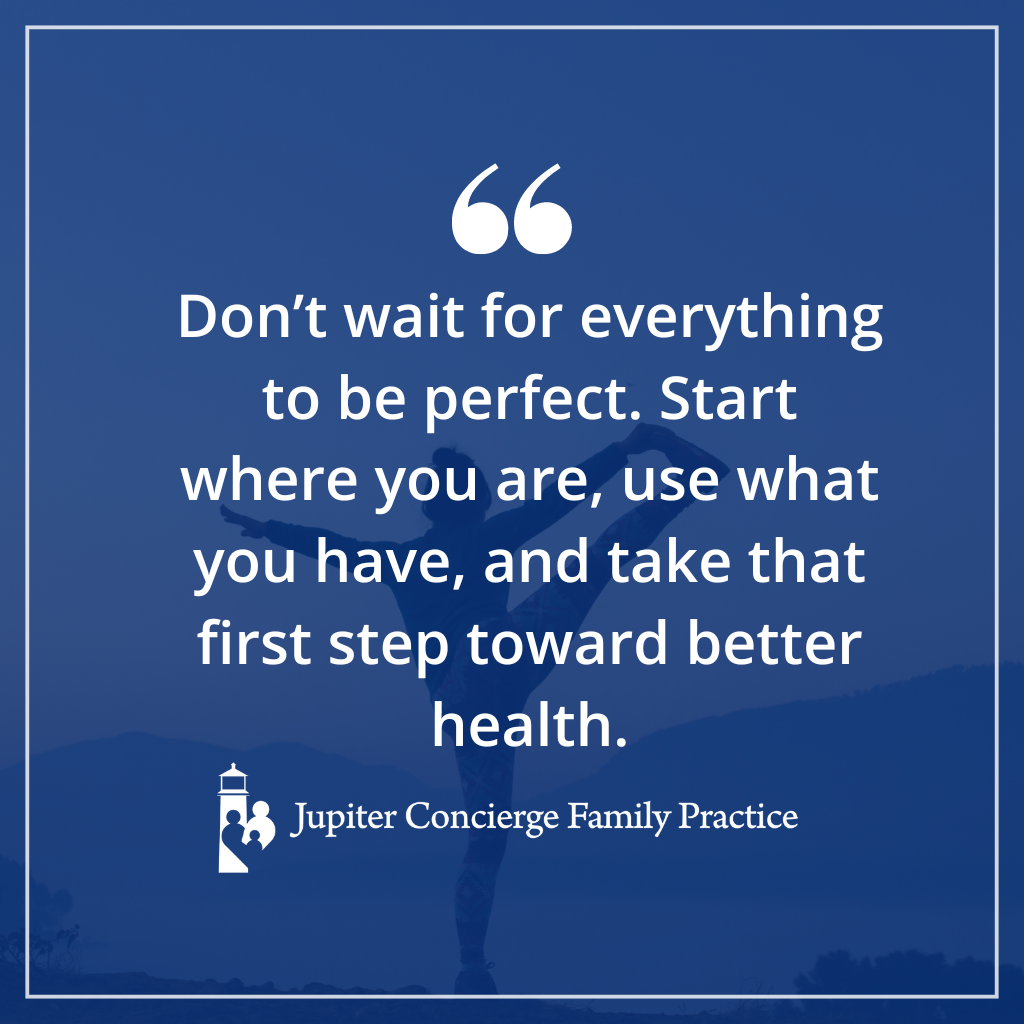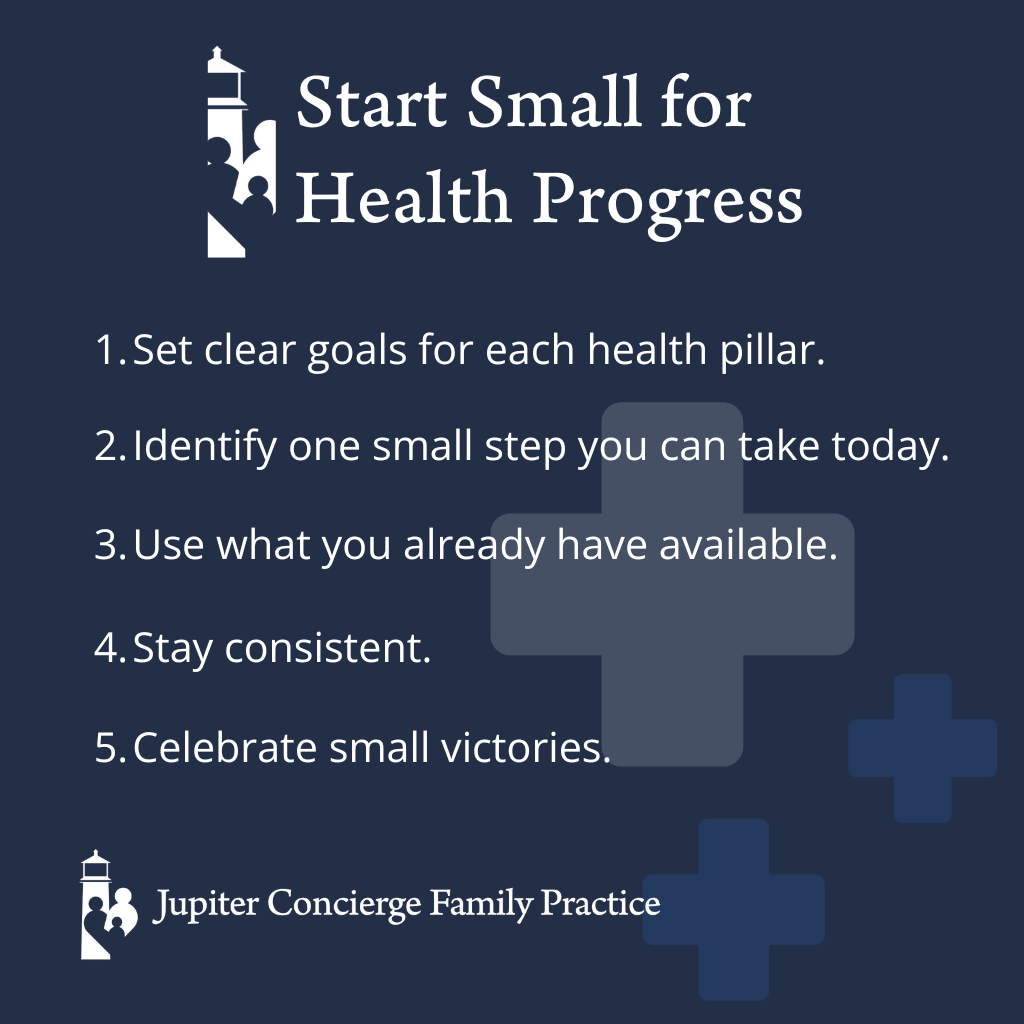
Tell me if this sounds familiar:
You have a big presentation next week, a final exam tomorrow, or an important call you’re not looking forward to making. As you think about getting started, you’re suddenly overcome with the need to clean your desk. Or organize your books. Or grab a cup of coffee.
We often convince ourselves these things are necessary before we can start a task, but in reality, they’re just excuses to procrastinate. The same principle applies to our health journey.
We know we should exercise, eat better, etc., but we don’t make progress because we believe we need something we don’t have before we can even begin.
An Example: The Equipment Excuse
Regular exercise is a notoriously difficult path to embark on, but what keeps so many of us from starting?
At least one major factor is this thought that we need something extra. We put our pursuit on pause because we don’t have a gym membership or the “right” workout equipment. As soon as we get that straightened out, we’ll get our fitness routine on track.
But these aren’t as important as we think. Sure, they might be useful at some point. But if they’re causing us to delay, then they’re really just one more form of procrastination.
The Power of “Want What You Have”
I’m fond of this maxim: “It’s more important to want what you have than to have what you want.” It’s a principle that applies to many aspects of life, and one that I find particularly apropos for our health journey.
We all possess a variety of material things, relationships, and resources. But just having them isn’t enough; we need to want them — to take advantage of what’s already at our fingertips.
Generally speaking, constantly wanting what we don’t have is a sign of never being satisfied. But wanting and appreciating what we already have? That’s a crucial component of mindfulness and contentment.
Apply “Want What You Have” to the Four Pillars of Health
I talk a lot about improving well-being by making positive changes in the Four Pillars of Health: exercise, nutrition, sleep, and stress elimination. Let’s explore how a “want what you have” mindset can help you make strides with each pillar.
1. Exercise
You don’t have to wait for the perfect gym equipment to arrive from Amazon to start improving your fitness. To expedite a new workout habit, simply take advantage of what’s around you:
- Improvise weights with household items, like soup or bean cans.
- Take walks or jogs in your neighborhood.
- Look up bodyweight resistance exercises — you’ll always have your body with you, even on vacation!
2. Nutrition
Improving your nutrition doesn’t mean creating and following the “perfect” meal plan. Instead of trying to change everything at once, start small:
- Start by Googling one healthy recipe to make once per week.
- Focus on that one healthy meal, and don’t beat yourself up the rest of the week. On your healthy meal day, think: “I had my treat yesterday. Today, I’m eating for my body’s sake.”
- After some time, you may find it easy to increase to two healthy meals per week.
3. Sleep
You might think you need the perfect mattress to improve your sleep, but making simple, small changes to your bedtime routine can make a big difference:
- Create a dark, cool sleep environment.
- Instead of watching TV before bed, try journaling to get racing thoughts out of your head and onto paper.
- Pick up a relaxing or uplifting book you’re interested in and read a few pages before lying down.
4. Stress Elimination
While we can’t eliminate all stress from our lives, certain techniques can help us reduce our experience of stress. And you don’t have to be an expert for them to help:
- Try meditating for just 60 seconds a day.
- Practice deep breathing exercises.
- Incorporate mindfulness into daily activities.
My Personal Journey
Exercise is the pillar I’ve personally struggled most to maintain.
After work, I’d often come home feeling exhausted, and all I wanted was a nap. One day, though, I decided to use what I had — my pool. After jumping in for a quick 10-minute swim, I was surprised to find it left me feeling refreshed and energized for the rest of the evening.
This became my daily practice. Then, to remove obstacles during winter, I invested in heating the pool. While it costs money, it’s far cheaper in the long run than the potential health issues from inactivity.
By wanting what I had (my pool) and removing barriers to its use, I was able to create a sustainable exercise habit.
The Power of Starting Small
Perfect is often the enemy of progress. The most important thing is to start with your goal in mind and take that first step, no matter how small.
Further, it’s crucial to understand that transforming your health takes time. Be patient with yourself. It probably took years to develop your current habits. The key to sustained change is to start small and build consistency:
- Set clear goals for each health pillar.
- Identify one small step you can take today.
- Use what you already have available.
- Stay consistent.
- Celebrate small victories.
Conclusion: Just Do It
Nike’s slogan “Just Do It” perfectly encapsulates this philosophy. The most important thing is to get started, regardless of how small the step may seem.
Don’t wait for everything to be perfect. Start where you are, use what you have, and take that first step toward better health.
So, what’s one small step you can take today using what you already have? Your future self will thank you for starting now, rather than waiting for the “perfect” moment or equipment. Embrace the power of wanting what you have, and transform your health one small step at a time.


Dr. David Rosenberg
Dr. Rosenberg is a board-certified Family Physician. He received his medical degree from the University of Miami in 1988 and completed his residency in Family Medicine at The Washington Hospital in Washington, Pennsylvania in 1991. After practicing Emergency Medicine at Palm Beach Gardens Medical Center for two years, he started private practice in Jupiter, in 1993. He is an avid baseball fan and Beatles fanatic, since he was 8 years old. He has been married to his wife, Mary, since 1985 and has three grown children.
David completed additional studies at Mercer University, Macon, Georgia and obtained a BS in Chemistry in 1983.
“My interests include tennis, snow skiing, Pilates and self-development.”

